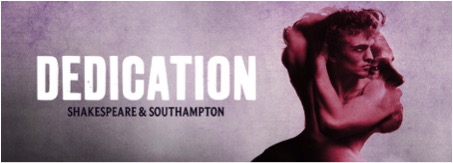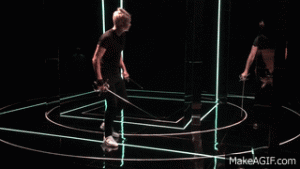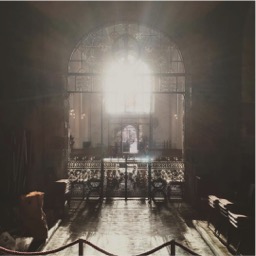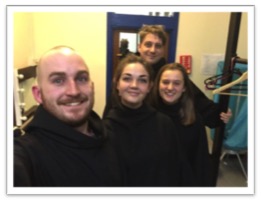Dedication
By Peter Bridgwood (MMus Performance) Written by the acclaimed playwright Nick Dear, Dedication explores the relationship between William Shakespeare and the 3rd Earl of Southampton Henry Wriothesley. Taking the extremely limited knowledge that we have about their relationship, Dear postulates three different story lines; an old man obsessed with the young Lord; a business relationship like any other; or a sordid love affair, condemned by the society of the time. As a performer, to be asked to be a part of this new production with The Nuffield theatre, there was only one course of action. I leapt at the chance.
 Unlike the university society productions that I have been a part of before, Dedication was an entirely new project. The script, the stage, and the music were all being built from scratch. A slightly daunting project to be a part of, but the experience would be incredibly valuable, and hard to come by in any other setting
Unlike the university society productions that I have been a part of before, Dedication was an entirely new project. The script, the stage, and the music were all being built from scratch. A slightly daunting project to be a part of, but the experience would be incredibly valuable, and hard to come by in any other setting
The Process begins For the choir, the process began at the end of July. We met with a selection of the production team to discuss the show, what it was about, and how the music would fit into the production. This meeting was as much for us to see what we would be doing, as it was for them to see what we were able to do. At this point, very little music had been composed (bear in mind that the first preview was on the 9th of September, just over a month away); we were given a few pages of the opening scene, and (having just seen the music myself) took the choir through the section, with the director reading in the lines, giving us our first glimpse at our role in the play. Over the next couple of weeks, we are drip fed music, and do our best to learn the music as quickly as possible.
 Our first rehearsal with the actors was to take place on the 1st of September (just over a week before we opened for previews), and it was only a few days before that we got the final composed sections of music. We therefore faced the slightly daunting task of sight reading a large section of music in a staggered run. Nevertheless, we persevered, and throughout the day I discovered just how hard we were going to have to work over the next week, not because we needed a large amount of rehearsal time (there were sections that we didn’t know, but they could be fixed after a few hours chained to a piano), but because the music was so intertwined with the text, and getting this mix of script and song right was key to our role in the production. The ever changing nature of the script, even the cut or addition of a single line, could dramatically change how the music fit, and how the scene could be interpreted. And so, after a long day in London, having done a shaky, staggered run of the show (our first chance to see it in its entirety), I came away with a to do list from the director before the technical rehearsals began the following week.
Our first rehearsal with the actors was to take place on the 1st of September (just over a week before we opened for previews), and it was only a few days before that we got the final composed sections of music. We therefore faced the slightly daunting task of sight reading a large section of music in a staggered run. Nevertheless, we persevered, and throughout the day I discovered just how hard we were going to have to work over the next week, not because we needed a large amount of rehearsal time (there were sections that we didn’t know, but they could be fixed after a few hours chained to a piano), but because the music was so intertwined with the text, and getting this mix of script and song right was key to our role in the production. The ever changing nature of the script, even the cut or addition of a single line, could dramatically change how the music fit, and how the scene could be interpreted. And so, after a long day in London, having done a shaky, staggered run of the show (our first chance to see it in its entirety), I came away with a to do list from the director before the technical rehearsals began the following week.
Wait, you do a degree too!? So I should probably mention at this point that during this whole process, I still had a Master’s degree that I needed to complete. I had to prepare for my final recital, the culmination of my 4 years studying here at the university, and it just so happened that it was scheduled slap bang in the middle of tech week. F**k. Not only did I have to rehearse a choir for a professional production, but I had to rehearse my own 60 mins of music to a professional standard as well.
Musical or Play? You may, at this point, be wondering exactly what sort of music we are doing in this play. Primarily we (the choir) are used as underscore (most films make use of choirs in a similar way), helping to generate the desired atmosphere for the scene or scene change; there are moments where our role is more overt. During the sword fight scene, we sing a quote of Shakespeare’s set to music
Love comforteth like sunshine after rain,
But Lust’s effect is tempest after sun.
Love’s gentle spring doth always fresh remain;
Lust’s winter comes ere summer half be done.
Love surfeits not, Lust like a glutton dies;
Love is all truth, Lust full of forged lies.
 Taken from Venus and Adonis, it highlights the tension that is being felt between the two characters at this point in the play, with the music itself mapping the climaxes of the fight (no easy feat, with the actors trying not to appear choreographed, but needing to match the music correctly). The music, and particularly the lyrics, are used to foreshadow the conclusion of the play. The words ‘Dies irae, dies illa’ (Day of wrath and doom impending) are specifically used under sections of Harry’s speech, giving us the uneasy sense that our two characters will not have a joyous ending.
Taken from Venus and Adonis, it highlights the tension that is being felt between the two characters at this point in the play, with the music itself mapping the climaxes of the fight (no easy feat, with the actors trying not to appear choreographed, but needing to match the music correctly). The music, and particularly the lyrics, are used to foreshadow the conclusion of the play. The words ‘Dies irae, dies illa’ (Day of wrath and doom impending) are specifically used under sections of Harry’s speech, giving us the uneasy sense that our two characters will not have a joyous ending.
 Tech week begins Now, I’ve done technical rehearsals before. As a member of Showstoppers, the musical theatre society here at the university we’d do a technical rehearsal on one day, a dress run on the next, then we open. This is for a musical, where all the material is already written, and there are no changes that need to be made, with a very simple staging setup. Dedication is none of these things. The stage is admittedly gorgeous, but it is also very complex; a square stage in the round, with 2 independent revolves, a rising central plinth, all clad in mirrored steel, embedded with multi-coloured LED strips. All of these elements needed to be integrated into the production, scene by scene. This led to many long days, with lots of sitting around. There were times where I felt that the director wasn’t giving as much time to the music as he should, but I also understood that we could (and did) sort it once the other aspects of the staging were locked.
Tech week begins Now, I’ve done technical rehearsals before. As a member of Showstoppers, the musical theatre society here at the university we’d do a technical rehearsal on one day, a dress run on the next, then we open. This is for a musical, where all the material is already written, and there are no changes that need to be made, with a very simple staging setup. Dedication is none of these things. The stage is admittedly gorgeous, but it is also very complex; a square stage in the round, with 2 independent revolves, a rising central plinth, all clad in mirrored steel, embedded with multi-coloured LED strips. All of these elements needed to be integrated into the production, scene by scene. This led to many long days, with lots of sitting around. There were times where I felt that the director wasn’t giving as much time to the music as he should, but I also understood that we could (and did) sort it once the other aspects of the staging were locked.
Tech week is over? Previews begin Having never been a part of a new production before, the idea of previews was an alien one to me. Why would people come to see a half-finished show? The reality is obvious of course. Developing a new show, insulated from the wider audience, is incredibly reckless. It is a necessity to see how the audience reacts, what works and doesn’t work, what problems occur that we could never have been noticed in a rehearsal. I was constantly amazed at how drastically a show can change after a single preview. Oh, you thought that tech week was over? Think again. All these changes, even small ones, required more technical rehearsals to fit back into the show, reworking of the music to make it refit, cutting some sections, adding others. At one point the entire ending was changed (axing a song that I had personally spent several weeks on), but that ultimately made the show a more cohesive whole. All of this adds up to long days. The show continues to change, to evolve, and as we become more familiar with it, we understand more and more how our role worked, very specifically, to support the action on stage.
Opening night Previews are over. Tech rehearsals have finished. We open tonight to the press and public alike. Having been a part of the development process, I was more nervous than I normally am for a performance, feeling immensely responsible for the outcome of tonight, even though I played a relatively small part.
90 mins later, it’s over. Sadly, our opening night was slightly muted, despite our successful performances, by a stage malfunction. We had done our job. As had all the creatives. With no more directions to make, lines to edit, or music to score/compose, they all moved on to other projects, and we’re left to ‘rinse and repeat’. And now, the day to day begins. There are no more daytime rehearsals, all that remains is our evening performances, along with the odd matinee. Audiences of varying sizes come and go, and we keep on going, the final show date looming ever closer.


